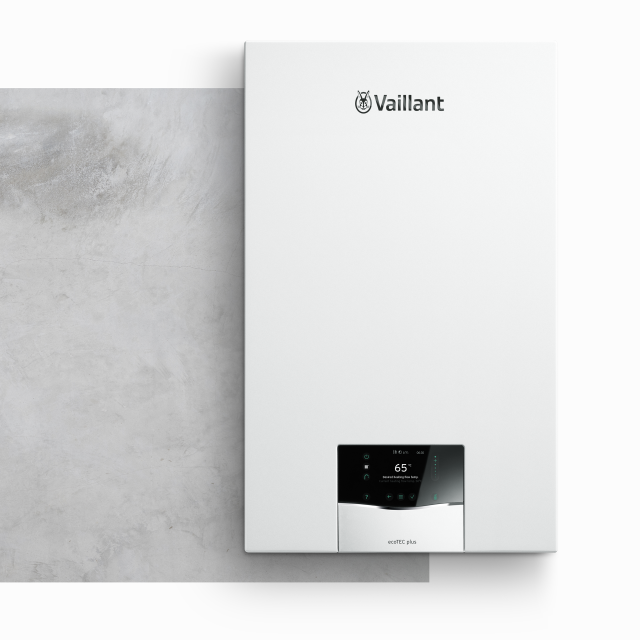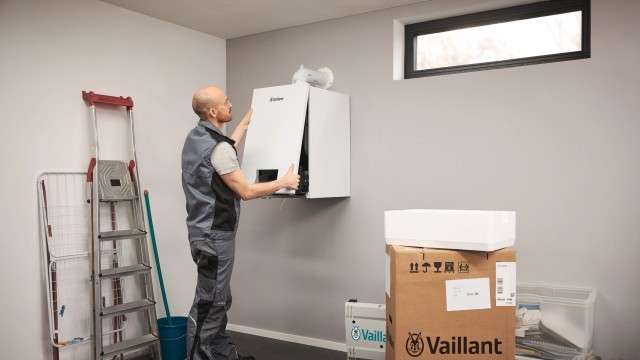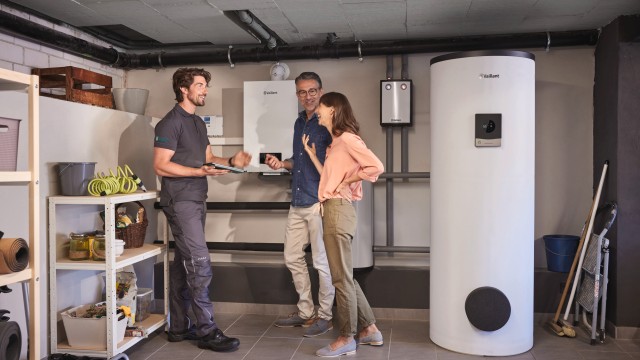Find your perfect gas boiler
Together with a certified partner you analyse your situation and find your future gas boiler.

Modern gas condensing technology is beneficial in many ways. It suits almost every home, offers high levels of comfort for heating and hot water and involves comparatively low costs and installation effort Additionally, it reduces energy consumption used for heating by up to 30% when replacing old boilers. On this page, you’ll find all relevant information about the different options, functionalities, advantages and costs.

From reasonable purchase prices and efficient operation to reduced environmental impacts and lesser space requirements within your home: Gas condensing technology for your heating has a whole set of advantages to it – not only compared to conventional gas and oil heating systems.
The operating principle of a condensing gas boiler is rather simple, yet effective: it not only optimally utilises the supplied energy, but also the thermal energy of the flue gas.
In general, burning gas produces heat which is used to heat up water in the boiler. This water is fed through a pipe system into the radiators – which release the heat directly into the room. At the same time, the boiler extracts additional heat from the waste gases by condensing this water vapour to liquid water, thus recovering its latent vaporisation heat. As a result, this heat is also converted into heat that can be used for heating.
Thanks to its maximum use of energy, gas condensing technology reduces both heating costs and emissions.
All of our gas devices are gas-adaptive and capable to work with following gas types:
Heating with natural gas.
Your boiler is supplied directly through the gas grid connection and thus provides efficient heat.
Heating with liquified gas.
If your home is off the public gas grid, liquified gas is a reasonable alternative. Using it requires a gas tank that’s installed in your basement or garden – even below ground level to make it almost invisible!
Heating with biogas.
If heating is an environmental matter to you, biogas is the way to go: Obtained from organic waste, it counts as a renewable energy.
The main differences in modern gas central heating systems are size- and performance-related. The different models provide solutions for limited space as well as increased power demand.

Repeating malfunctions, noise pollution, interruptions of the hot water supply or the need for reduced heating costs by means of more efficiency: Reasons for a replacement of your old boiler can be quite different. But it’s always a comparatively small invest and quick solution that provides increased comfort and significant saving potentials on the long run. Our boilers use latest gas condensing technology to increase not only comfort, but also efficiency over conventional systems – reducing heating costs by up to 30% when replacing your old boiler.
Is it time for you to replace your old heating? If so, here you find all the information you need.

There are different technologies available to be combined with your gas boiler. One very common combination option is gas with a heat pump.
Heat pumps provide warmth in a far more ecological manner – but with limits when it comes to the reachable flow temperature.That’s why their capacities might not be sufficient in every case, like not optimally insulated buidlings. Yet, they’re an ideal choice when combining them with a gas central heating: The heat pump serves as your main heat supplier whenever outdoor temperatures allow for efficient use, while your gas heating system provides sufficient warmth and hot water in all other situations.
Whether you want to replace your old boiler or look for the ideal solution in a new construction: Gas central heating systems are generally less expensive than oil heating systems – and a combi boiler is cheaper than a floor standing one. This applies to boiler prices as well as to installation.
Together with a certified partner you analyse your situation and find your future gas boiler.
Your local Vaillant installer provides you with an offer including your specific components and installation costs
Your local Vaillant installer installs your new gas boiler and takes care of your old one. He can offer you a 5 year warranty and a service contract.
The easiest way to save on heating costs is to lower your room temperature by 1-2° C:
Reducing room temperature by a single degree can already save up to 6% of heating costs. Thanks to the higher efficiency of modern gas central heating systems, you can even achieve similar savings without compromising your living comfort.
The overall costs of replacing your old gas heating are subject to several factors – from prices of the boiler and its flue gas system to the costs for installation. Our certified installers are happy to provide you with a detailed cost estimate.
The ideal choice and placement of your new boiler depends on your housing situation: The given space and connections from older heating systems are decisive to determine the boiler that suits your home best. Floor-standing boilers require about 3 m² for installation, while wall-hung boilers can be space-savingly installed in unused niches and corners.
For maximum efficiency and safety, your new appliances should be subject to annual maintenance.
To have one of our certified partners service your heating system on a regular basis helps to increase its lifespan significantly.
Our gas boilers are generally suitable for both, radiators and underfloor heating. How they’re set up depends on your heating type: Compared to older radiator models, gas condensing technology is ideally paired with underfloor heating. This way it offers the same increased efficiency that new low-temperature radiators provide.
You should find the type plate with product name either on the appliance’s downside or behind the operating panel flap. If product details aren't specified on the appliance, either look it up in the user manual or get the information from your installer.
For more detailed information about gas central heating in general or Vaillant appliances, you can download the following brochures.